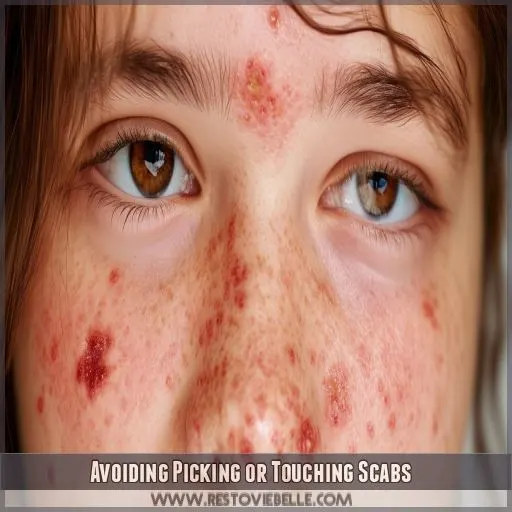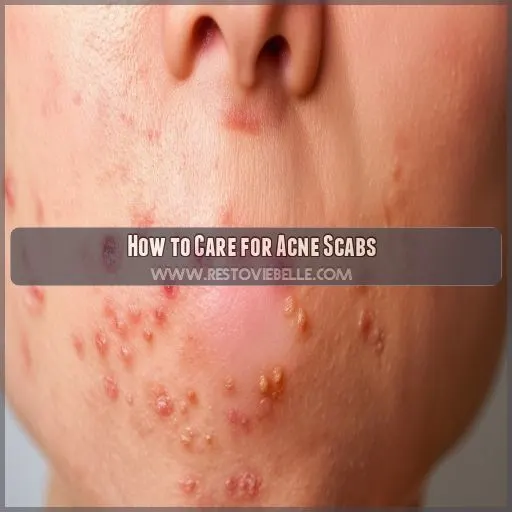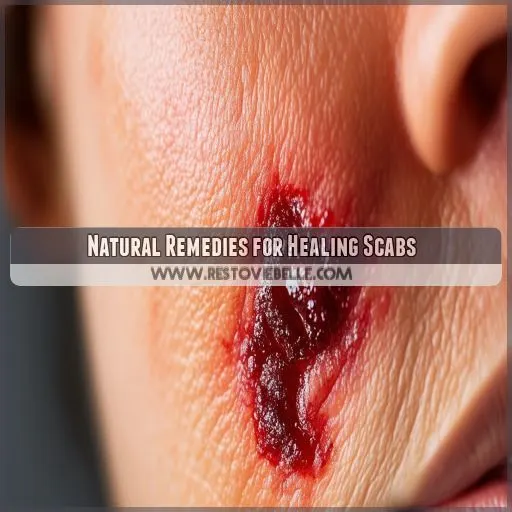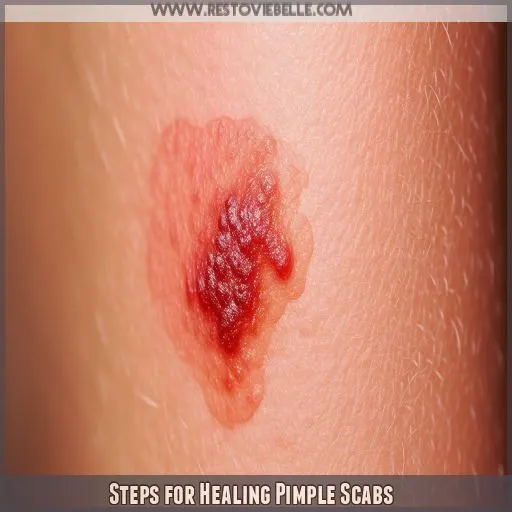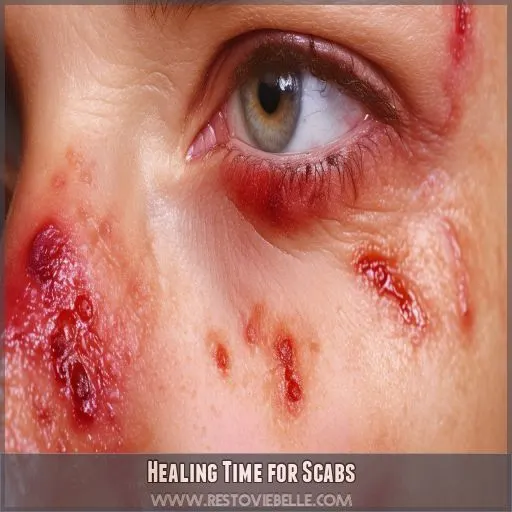This site is supported by our readers. We may earn a commission, at no cost to you, if you purchase through links.
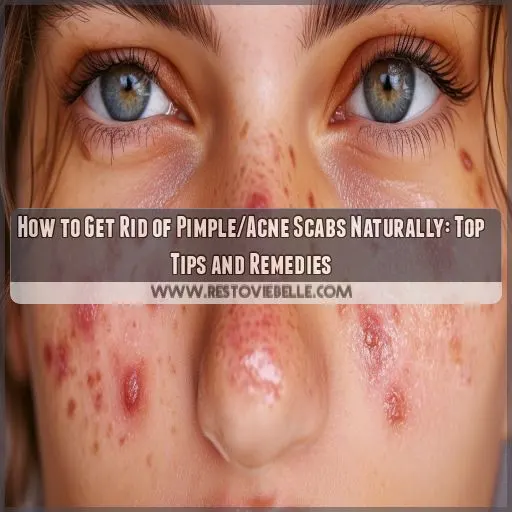
Avoid picking scabs, keep them clean, and use natural solutions like Aloe vera and plantain leaf paste.
With professional insights, you’ll master scab care, promote healing, and avoid infections.
Delve into this guide for clear, concise, and practical advice.
Table Of Contents
- Key Takeaways
- How to Get Rid of Pimple/acne Scabs Naturally?
- Avoiding Picking or Touching Scabs
- How to Care for Acne Scabs
- Natural Remedies for Healing Scabs
- Steps for Healing Pimple Scabs
- Healing Time for Scabs
- Frequently Asked Questions (FAQs)
- How to heal a pimple scab quickly?
- How to heal picked acne fast?
- What to put on a popped pimple to heal?
- What is the clear liquid that comes out of a pimple after you pop it?
- What causes pimple scabs to form?
- Is aloe vera good for scabs?
- Can I use honey on acne scabs?
- What oils help heal pimple scabs?
- How often should I wash scabs?
- Conclusion
Key Takeaways
- Hands off the scabs! Picking can lead to scars that will make your skin cry.
- Keep it clean: Wash scabs gently twice a day to prevent infection and help them heal faster.
- Nature’s healers: Aloe vera and plantain leaf paste can soothe and speed up healing like a magic wand.
- Listen to your skin: If scabs show signs of infection, don’t hesitate to consult a healthcare professional. They’ll help you kick infection to the curb and get your skin back on track.
How to Get Rid of Pimple/acne Scabs Naturally?
To get rid of a pimple or acne scab naturally, avoid picking at or touching it to prevent infection and scarring.
Keep the area clean using mild soap, and apply moisturizers like aloe vera to keep it hydrated. A warm compress can boost blood flow for faster healing.
Natural remedies such as plantain leaf paste can soothe inflammation, while onion and garlic juice fight bacteria. Sunscreen protects the area from further damage. If necessary, use antibiotic cream to stave off infection.
Typically, smaller scabs heal within a week, while larger ones take longer. Want more tips? Stick around!
Avoiding Picking or Touching Scabs
To help skin heal faster, avoid picking or touching scabs as this can lead to scarring and infection. Use moisturizers, apply a bandage, and keep the area clean to support the healing process.
Use Moisturizers
Using noncomedogenic moisturizers helps keep pimple scabs hydrated without clogging pores. Light moisturizers with tea tree oil can reduce inflammation, while aloe vera’s soothing properties promote healing. Gentle soap cleanses without irritation. Oils like coconut, castor, mineral, calendula, and almond also lock in moisture, aiding recovery. Avoid touching to prevent infection.
Applying a Bandage
Applying a bandage over your pimple scabs prevents picking and promotes wound healing. Pick the right size and material to guarantee proper coverage and breathability. Aim to change the bandage regularly, usually once daily, to keep the area clean. When removing, do it gently to avoid disrupting the healing process.
- Choose breathable material.
- Use an appropriately sized bandage.
- Change daily.
- Remove gently.
Keeping the Area Clean
Keep the area around the scab clean by gently washing with a mild, fragrance-free soap and warm water. Pat the skin dry instead of rubbing. You can also apply a Warm compress to the scab for 10-15 minutes to increase blood flow and speed healing. Avoid harsh scrubbing or picking at the scab.
How to Care for Acne Scabs
To care for acne scabs, keep the area clean and your skin moisturized. Use a warm compress to boost blood flow, apply sunscreen to protect from sun damage, and use antibiotic cream to prevent infection.
Keeping Scabs Clean
To keep pimple scabs clean and promote healing, wash the area gently twice daily with mild soap. Pat dry with a soft towel to avoid irritation, then apply a warm compress to increase blood flow.
- Cleanse gently: Use mild soap and water.
- Pat dry: Avoid rubbing the scab.
- Warm compress: Promotes healing.
Keeping Skin Moisturized
Keeping your skin moisturized is vital when dealing with acne scabs. Look for products with emollient properties like olive oil or aloe vera to hydrate and soothe the skin. Avoid harsh cleansers and opt for gentle, natural remedies like onion juice or honey to minimize irritation. Proper hydration will help your skin heal faster.
| Moisturizing Products | Emollient Properties |
|---|---|
| Olive Oil | Hydrates Skin |
| Aloe Vera | Soothes Irritation |
| Honey | Promotes Healing |
| Onion Juice | Reduces Inflammation |
| Natural Remedies | Sensitive Skin Care |
Using a Warm Compress
Using a warm compress can boost your skin’s healing by improving blood flow and reducing soreness. Here are steps to do it effectively:
- Ingredients: Use warm water and a clean cloth.
- Benefits: Speeds up the healing of acne scabs.
- Instructions: Apply the warm compress for 5-10 minutes daily.
- Side Effects: Rare, but watch for irritation.
Using Sunscreen
Sun exposure can worsen scars and delay healing. Applying sunscreen with a suitable sun protection factor (SPF) shields your skin from harmful UV rays. Choose a non-comedogenic sunscreen that suits your skin type. Reapply every two hours when outdoors. This practice aids in how to get rid of pimple/acne scabs naturally, preventing further damage and aiding recovery.
Applying Antibiotic Cream
If your pimple scabs show signs of infection, such as increased redness, warmth, or pus, your doctor may prescribe topical or oral antibiotics. Follow dosage instructions carefully to avoid antibiotic resistance. Topical antibiotic creams can help heal infected scabs, while oral antibiotics treat more severe cases. Monitor for side effects and use as directed to promote proper healing.
Natural Remedies for Healing Scabs
To naturally heal pimple scabs, consider using remedies like plantain leaf paste, aloe vera, and other natural solutions. These methods can soothe the skin, reduce inflammation, and promote faster healing without harsh chemicals.
Plantain Leaf Paste
Plantain leaf paste can work wonders for acne scabs, thanks to its healing properties. Boil 10 fresh leaves until soft, mash them, and mix in a few drops of oil. Spread this natural remedy over the scabs, cover with gauze, and let it sit overnight. Its anti-inflammatory and antibacterial properties can hasten healing.
Aloe Vera
Aloe vera is a natural powerhouse for healing pimple scabs. Its soothing properties can reduce inflammation, while its antibacterial effects help prevent infection. Simply cut off a small piece of aloe plant, squeeze the juice over the scab, and let it dry. Repeat this 4-5 times daily for maximum skin-nourishing benefits.
Other Natural Remedies
Besides aloe vera, other natural remedies can aid in healing acne scabs. Consider applying onion juice or garlic juice to fight bacteria. Honey is known for its healing properties. You can also mix calendula oil with a carrier oil to soothe irritation. Apple cider vinegar, when diluted, can help disinfect and promote healing, too.
Steps for Healing Pimple Scabs
Begin by washing your scabs with a gentle cleanser and applying a light oil, such as castor or coconut, to soften dead skin. To speed up healing and reduce irritation, use a warm compress and soothe the area with aloe vera or plantain leaf paste.
Washing Scabs and Applying Oil
To wash scabs and apply oil, start by gently cleansing the area with a mild face wash. Next, use a cotton ball to apply a few drops of castor, coconut, or olive oil to the scabs. This helps soften and remove any dead skin. Be sure to avoid scrubbing or picking at the scabs.
Using Warm Compress
After washing and applying oil, use a warm compress to encourage blood flow and speed up healing. Soak a clean cloth in warm water (around 104°F), wring it out, and apply it to the scab for 10-15 minutes, three times a day. Using a soft, breathable fabric guarantees maximum comfort and effectiveness. Combine with other natural remedies for best results.
Soothing With Aloe Vera or Plantain Leaf Paste
For soothing pimple scabs naturally, try aloe vera or plantain leaf paste. Aloe vera’s effectiveness in reducing inflammation fosters faster healing. Alternatively, the benefits of plantain leaves include antibacterial properties** that promote skin repair. Both natural remedies are safe, offering gentle soothing alternatives. Compare ingredients to determine which best suits your skin’s needs.
Healing Time for Scabs
Small scabs typically heal within 3-7 days, while larger scabs may take up to 2 weeks or longer to fully heal. If your scabs don’t heal within 2 weeks or show signs of infection, it’s best to consult a healthcare professional for proper treatment.
Small Scabs
Small scabs typically heal within 3-7 days. Use natural remedies like applying plantain leaf paste or aloe vera to speed up recovery. Keep the area clean and moisturize with noncomedogenic products. Try not to pick at the scabs to avoid scarring. A warm compress can increase blood flow, promoting faster healing.
Larger Scabs
Larger scabs can take up to two weeks or more to heal. Keep the area clean, moisturized, and use warm compresses to boost blood flow. Be vigilant for signs of infection—redness, pus, warmth, pain—since these larger scabs are at higher risk. Proper care helps prevent scarring and guarantees a smoother healing process.
Consulting a Healthcare Professional if Necessary
If your pimple scabs don’t heal within 2 weeks or show signs of infection like worsening redness, fever, warmth, or pus, it’s best to consult a healthcare professional. They can prescribe oral or topical antibiotics to prevent infection and help your skin heal properly without scarring. Follow their guidance on your skincare routine for the most effective results.
- Seek medical attention if scabs don’t heal within 2 weeks.
- Watch for signs of infection like redness, fever, warmth, or pus.
- Antibiotics may be prescribed to prevent infection and promote healing.
- Follow your healthcare provider’s recommendations for your skincare routine.
Frequently Asked Questions (FAQs)
How to heal a pimple scab quickly?
To heal a pimple scab quickly, gently cleanse the area, apply a warm compress, and use a non-comedogenic moisturizer. Avoid picking or irritating the scab, and let it heal naturally.
How to heal picked acne fast?
Did you know? Over 50 million Americans experience acne. To heal picked acne fast, keep the area clean, avoid touching it, and use aloe vera for soothing. Warm compresses can reduce inflammation and promote healing.
What to put on a popped pimple to heal?
Apply aloe vera gel or tea tree oil to the area. These natural remedies can reduce inflammation, promote healing, and prevent infection. Keep the area clean and moisturized to aid in the healing process.
What is the clear liquid that comes out of a pimple after you pop it?
The clear liquid that oozes from a popped pimple is sebum, the natural oil your skin produces. This fluid helps cleanse and heal the blemish, but avoid popping pimples to prevent infection and scarring.
What causes pimple scabs to form?
Pimple scabs form when you pop or pick at pimples, leading to minor wounds. Blood platelets then clot, hardening into scabs that protect against infection while healing. Excess oil, bacteria, and inflammation contribute to their formation.
Is aloe vera good for scabs?
Yes, aloe vera is beneficial for scabs. It’s soothing, reduces inflammation, and promotes healing. Apply the gel directly to the scab multiple times daily. It’s a natural, effective remedy for maintaining moist, pliable scabs.
Can I use honey on acne scabs?
Yes, honey can be an effective natural remedy for acne scabs. Its antimicrobial and anti-inflammatory properties help promote healing while soothing irritation. Just apply a thin layer of raw honey to the affected area.
What oils help heal pimple scabs?
When healing pimple scabs, use tea tree oil for its antibacterial properties, aloe vera oil for soothing effects, and rosehip oil to reduce scars. Apply these oils gently to promote faster healing and minimize irritation.
How often should I wash scabs?
You should wash your scabs twice daily using a gentle cleanser. This routine keeps the area clean, helps prevent infection, and promotes faster healing without irritation. Avoid aggressive scrubbing, which can delay recovery and cause scarring.
Conclusion
Ultimately, your skin’s resilience holds the key to overcoming pesky pimple scabs. By avoiding picking, keeping scabs clean, and applying natural remedies like aloe vera and plantain leaf paste, you can promote faster healing and prevent infections.

